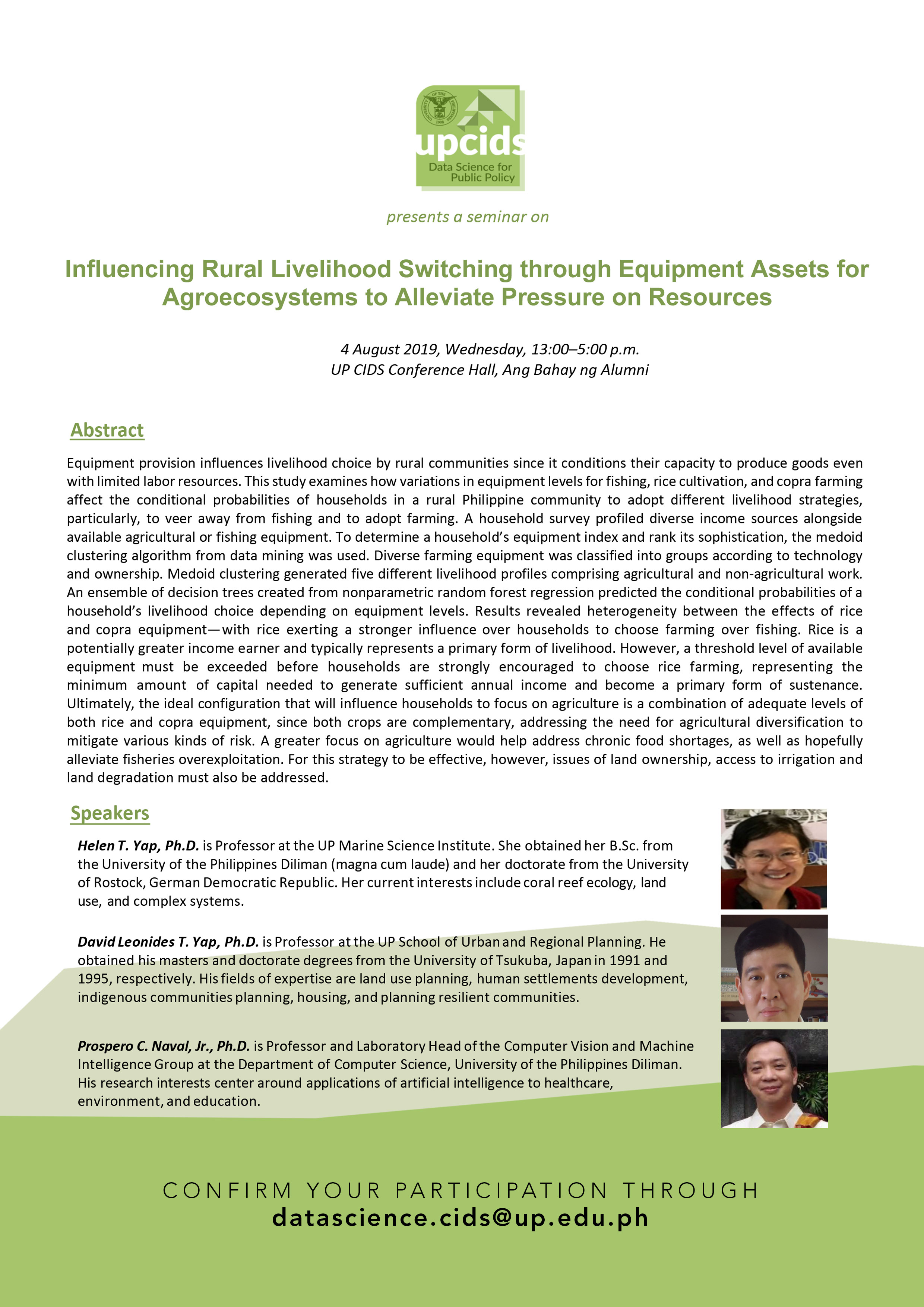Data Science for Public Policy Discussion Series: Influencing Rural Livelihood Switching through Equipment Assets for Agroecosystems to Alleviate Pressure on Resources

The UP CIDS Program on Data Science for Public Policy (DSPP) invites everyone to the seminar Influencing Rural Livelihood Switching through Equipment Assets for Agroecosystems to Alleviate Pressure on Resources on 14 August 2019 (Wednesday), 3:00–5:00 PM, at the UP CIDS Conference Hall, LGF Ang Bahay ng Alumni, UP Diliman, Quezon City.
Abstract
Equipment provision influences livelihood choice by rural communities since it conditions their capacity to produce goods even with limited labor resources. This study examines how variations in equipment levels for fishing, rice cultivation, and copra farming affect the conditional probabilities of households in a rural Philippine community to adopt different livelihood strategies, particularly, to veer away from fishing and to adopt farming. A household survey profiled diverse income sources alongside available agricultural or fishing equipment. To determine a household’s equipment index and rank its sophistication, the medoid clustering algorithm from data mining was used. Diverse farming equipment was classified into groups according to technology and ownership. Medoid clustering generated five different livelihood profiles comprising agricultural and non-agricultural work. An ensemble of decision trees created from nonparametric random forest regression predicted the conditional probabilities of a household’s livelihood choice depending on equipment levels. Results revealed heterogeneity between the effects of rice and copra equipment—with rice exerting a stronger influence over households to choose farming over fishing. Rice is a potentially greater income earner and typically represents a primary form of livelihood. However, a threshold level of available equipment must be exceeded before households are strongly encouraged to choose rice farming, representing the minimum amount of capital needed to generate sufficient annual income and become a primary form of sustenance. Ultimately, the ideal configuration that will influence households to focus on agriculture is a combination of adequate levels of both rice and copra equipment, since both crops are complementary, addressing the need for agricultural diversification to mitigate various kinds of risk. A greater focus on agriculture would help address chronic food shortages, as well as hopefully alleviate fisheries overexploitation. For this strategy to be effective, however, issues of land ownership, access to irrigation and land degradation must also be addressed.
Speakers
Helen T. Yap, Ph.D. is Professor at the UP Marine Science Institute. She obtained her B.Sc. from
the University of the Philippines Diliman (magna cum laude) and her doctorate from the University of Rostock, German Democratic Republic. Her current interests include coral reef ecology, land use, and complex systems.
David Leonides T. Yap, Ph.D. is Professor at the UP School of Urban and Regional Planning. He
obtained his masters and doctorate degrees from the University of Tsukuba, Japan in 1991 and
1995, respectively. His fields of expertise are land use planning, human settlements development, indigenous communities planning, housing, and planning resilient communities.
Prospero C. Naval, Jr., Ph.D. is Professor and Laboratory Head of the Computer Vision and Machine Intelligence Group at the Department of Computer Science, University of the Philippines Diliman. His research interests center around applications of artificial intelligence to healthcare, environment, and education.
Register
Interested individuals and/or groups may confirm their attendance through [email protected].